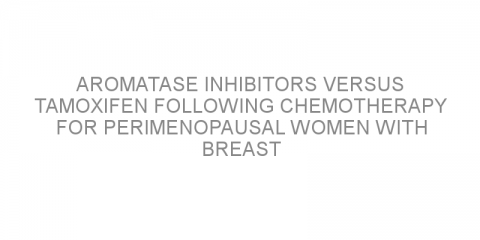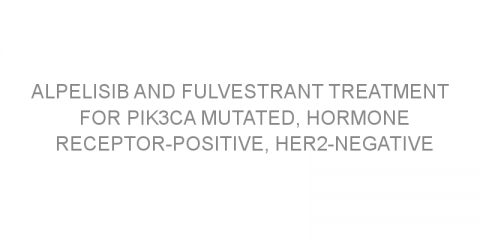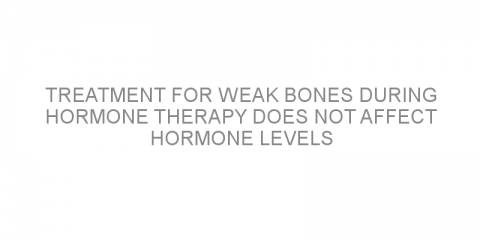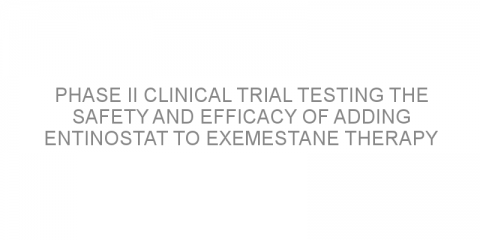In a nutshell This study evaluated the effectiveness of antiresorptive drugs on bone mineral density (BMD) in postmenopausal women with early-stage breast cancer (BC) receiving treatment with aromatase inhibitors (AIs). The data showed that denosumab (Prolia) and zoledronic acid (Aclasta) were the most effective antiresorptive treatment options to...
Read MoreMenopausal status-Menopausal Posts on Medivizor
Aromatase inhibitors versus tamoxifen following chemotherapy for perimenopausal women with breast cancer
In a nutshell This study was carried out to assess the use of aromatase inhibitors (AI) versus tamoxifen (Novaldex) for women before menopause with estrogen receptor-positive (ER+) breast cancer (BC). The authors found that AIs were associated with better outcomes than tamoxifen in these patients. Some background About 80% of all BCs...
Read MoreReal-world outcomes of fulvestrant as first-line treatment of postmenopausal women with advanced breast cancer.
In a nutshell This study investigated the effectiveness of fulvestrant (Faslodex) as a first-line treatment for postmenopausal women with estrogen receptor-positive (ER+) metastatic breast cancer (BC) in a real-world setting. The data showed that the outcomes of these patients in the real-world setting were similar to clinical trials...
Read MoreReviewing treatments for genitourinary symptoms in breast cancer survivors
In a nutshell This review aims to discuss the current treatment options available for genitourinary (GU) symptoms related to menopause in breast cancer (BC) survivors. Some background Vulvovaginal atrophy (VVA; thinning, trying, and inflammation of the lining of the vagina) is one of the side effects of hormonal treatments given to patients with...
Read MoreAlpelisib and fulvestrant treatment for PIK3CA mutated, hormone receptor-positive, HER2-negative advanced breast cancer
In a nutshell This study aimed to investigate the combination of alpelisib (Piqray) and fulvestrant (Faslodex) in patients with PIK3CA-mutated, hormone receptor-positive (HR+), human epidermal growth factor 2 (HER2) negative, advanced breast cancer (BC). This study concluded that this combination provided positive outcomes for...
Read MoreHormone receptors; association with breast cancer outcome
In a nutshell The authors aimed to evaluate the prognostic (disease outlook) effect of the presence of certain hormone receptors on cancer cells. Some background Breast cancer is classified into different subtypes depending on the presence or absence of certain receptors (proteins found on the surface of the cancer cells). Breast cancer...
Read MoreRadiation after surgery; is it essential after 55?
In a nutshell The authors aimed to determine if there was a significant risk of cancer recurrence when breast-conserving therapy is the only treatment for women aged 55 and older. Some background A lumpectomy or 'breast-conserving therapy' is the removal of the breast and some surrounding tissues (the breast remains intact). This is...
Read MoreTreatment for weak bones during hormone therapy does not affect hormone levels
In a nutshell This article looked at the effects of endocrine therapy on hormonal changes during cancer treatment. Some background Hormone therapy to treat breast cancer is called endocrine therapy. This treatment is used in hormone receptor positive (HR+) early breast cancer. It causes changes to hormone signalling which can lead to early...
Read MoreEvaluating bone health in breast cancer patients
In a nutshell This review examines the role of bisphosphonates in postmenopausal (after menopause) women with breast cancer. Some background Menopause is the period in a woman’s life after menstruation stops and the ovaries become inactive, defined as 12 months after a woman's last period. With menopause, the level of female sex hormones...
Read MoreThe effects of goserelin combined with tamoxifen on hormone levels and endometium thickness
In a nutshell This study investigated the combined treatment of tamoxifen (nolvadex) and goserelin (zoladex) in women diagnosed with early stage hormone receptor positive breast cancer. Some background Growth of hormone receptor positive (HR+) breast cancer is stimulated by the hormone estrogen. Tamoxifen is an oral drug commonly used to treat HR+...
Read MoreDoes obesity influence how breast cancer patients will benefit from further hormonal therapy?
In a nutshell This article investigated whether the body mass index or BMI (defined as weight divided by the square of height) can be used to determine how a patient with breast cancer treated with hormonal therapy may benefit from further treatment with a type of hormonal therapy called aromatase inhibitors. Some background Aromatase inhibitors...
Read MorePhase II clinical trial testing the safety and efficacy of adding entinostat to exemestane therapy in hormone-resistant breast cancer patients
In a nutshell This phase II clinical trial tested whether a new drug, entinostat, can work in concert with exemestane (a hormone therapy drug), to fight breast cancer that no longer responds to hormone therapy alone. Some background Some breast cancers need estrogen (a female sex hormone) to grow. These breast cancer cells respond to estrogen via...
Read More













